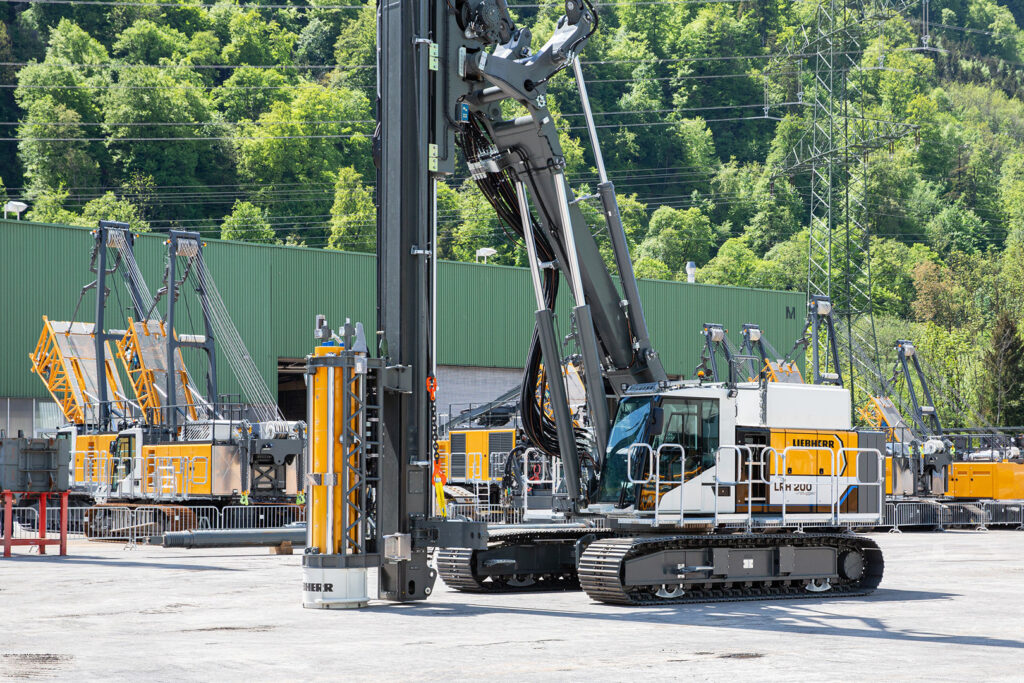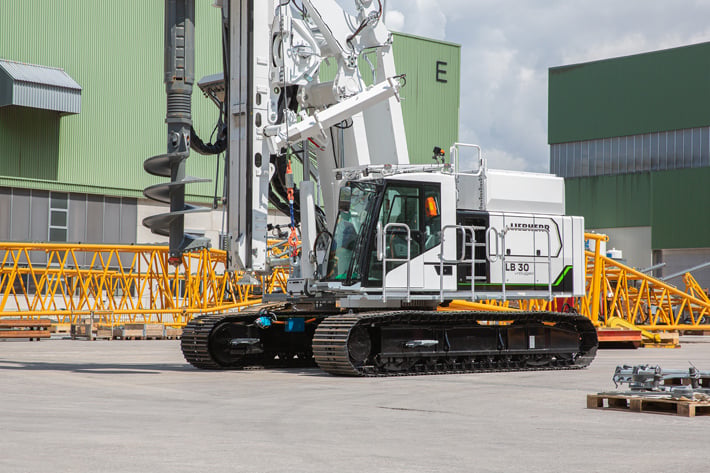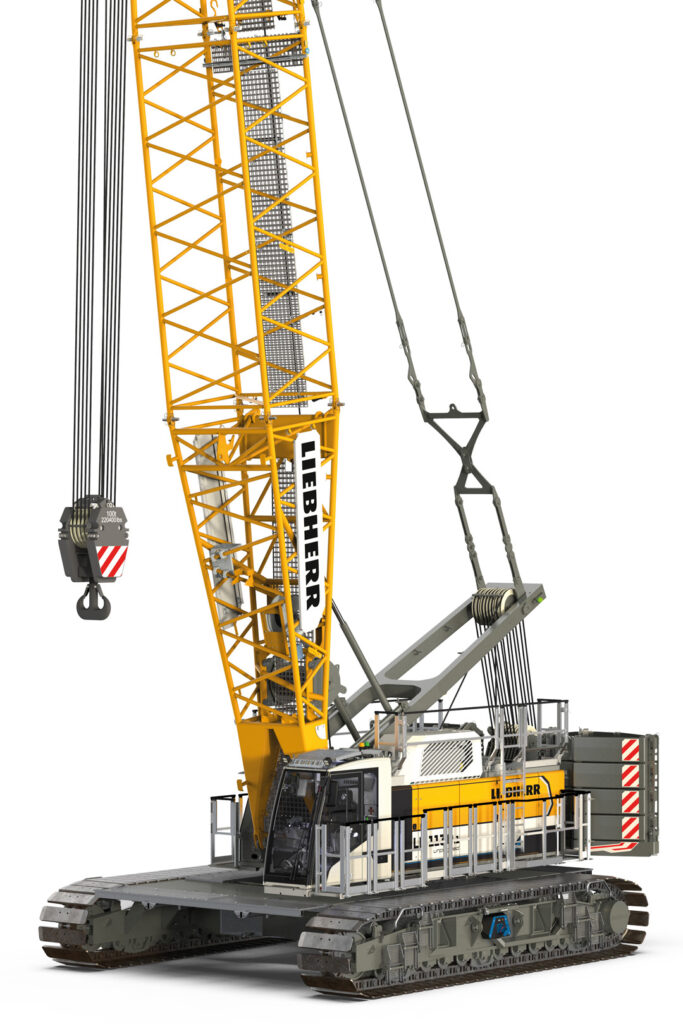Liebherr promptly reacted to the ever-changing requirements of the construction industry with the first battery-powered drilling rig in the world – the LB 16 unplugged. Today, no less than six new unplugged products can be presented from the fields of piling, drilling and lifting.
 Since the alternative drive of the LB 16 unplugged quickly established itself on the market as a Gamechanger, the design has been extended to further product areas. Today, the electrified unplugged series comprises crawler cranes as well as piling and drilling rigs.
Since the alternative drive of the LB 16 unplugged quickly established itself on the market as a Gamechanger, the design has been extended to further product areas. Today, the electrified unplugged series comprises crawler cranes as well as piling and drilling rigs.
An outstanding feature of the battery-powered unplugged units is zero emission. They do not produce any exhaust fumes and are extremely quiet. This strikes the right note especially in noise-sensitive regions and finds favour with construction site personnel and residents. Whether London, Paris or Oslo – the concept has already been successfully applied in these metropoles.
The battery is charged using a conventional jobsite electric supply. Operation can continue as normal while charging. In order to change to battery operation, you just need to pull out the plug, therefore: unplugged. Whether attached to the electric supply or not, the performance and range of application remains unchanged.
All six models are available in both conventional and battery-operated versions and have identical performance specifications.
Piling: LRH 100.1 unplugged and LRH 200 unplugged
The LRH 200 has been completely newly developed and closes the gap between the proven LRH 100 and LRH 600 in the series of piling rigs.
A 200-kWh battery pack ensures that the unplugged models can operate in battery mode for 4 to 5 hours in average pile-driving applications. Optionally, it can be upgraded to 400 kWh for 8 to 10 hours of operation.
The new design of the LRH 200 extends the range of applications and makes if even more versatile in use. In addition to piling, the machine can be used for continuous flight auger, full displacement and down-the-hole drilling, as well as for soil mixing work. A torque of 250 kNm provides the necessary power.
When equipped with the hydraulic hammer H 6 from Liebherr, the LRH 200 and the LRH 200 unplugged can lift piles up to 24.5 m long and weighing 16 tonnes. The machine especially excels with its large working range. A radius of up to 8.7 m has the advantage that the machine does not have to be constantly moved.
The design of the leader enables inclinations of up to 18° in all directions. Furthermore, it is also possible to raise or lower the leader by 6.5 m (e.g., when working in a foundation pit), which makes the machine even more flexible.
The Ground Pressure Visualization of the new LRH model calculates the current ground pressure in real time and compares it with the specified safety limits of the respective construction site. The ground pressure is displayed in the operator’s cabin. This means the operator is permanently aware of whether the machine is situated in, or is approaching, a critical area.
The operation of the new piling rig LRH 200 is based on the proven concept of the LRH 100 and is therefore very user-friendly. The integrated data recording makes the analysis of the pile data extremely easy and saves a huge amount of time.

Drilling: LB 25 unplugged and LB 30 unplugged
Over many years, the drilling rigs LB 25 and LB 30 have proven themselves in the conventional version. The new battery-operated unplugged versions are identical with regard to application possibilities, weight or transport; however they have the additional advantage of zero emission. The drilling rigs can be used for all common applications in the field of deep foundation.
Thanks to the optional extension of the drilling axis, the machines can be deployed for drilling diameters of up to 3.4 m. The optional rear support and the new design of the modular rear counterweight ensure higher stability and longer service life.
In addition to the standard design, both machines are available in a Low Head version with a total height of 14.1 m, or as Ultra Low Head with only 7.7 m.
For battery operation, the charging cable only needs to be unplugged and, for unlimited operation, reconnected to the construction site power supply. The battery is designed for a working time of 4 hours in Kelly operation. Whether in battery or plugged-in operation, the drilling performance remains unchanged.
Lifting: LR 1130.1 unplugged and LR 1160.1 unplugged.
The new machines LR 1130.1 unplugged and LR 1160.1 unplugged extend the range of crawler cranes from Liebherr-Werk Nenzing GmbH.
The electro-hydraulic drive of the new cranes has the same performance specifications as the conventional version. Both versions are operated in the same way, which is especially practical if the crane driver has to often change between machines in one fleet.
The capacity of the battery is designed for an average lifting operation of eight hours. Alternatively, the main boom with luffing jib can be completely erected. The battery can be recharged within only 2.5 to 4.5 hours. As an option, the performance can be increased by 20 to 60 per cent using additional batteries.
In idling mode, the sound pressure level of three unplugged cranes is equivalent to that of a normal conversation on the jobsite. This corresponds to a value of only 60 dB(A). If it is taken into account that a crawler crane is in idling mode for 60 % of the time on the jobsite, this low noise level is an advantage with great resonance.
The designers of the crane laid great emphasis on the safety concept. As with all crawler cranes from Liebherr-Werk Nenzing GmbH, the new battery-operated models are also available with all proven assistance systems.
The latest system is the Gradient Travel Aid for the safe negotiation of slopes and inclines. The crane’s control system automatically calculates the centre of gravity and warns the operator before the crane leaves the safe area. While travelling, the operator receives information about the permissible and actual gradient, and the crane’s overall centre of gravity at all times.

 Copyright 2020 All rights reserved.
Copyright 2020 All rights reserved.